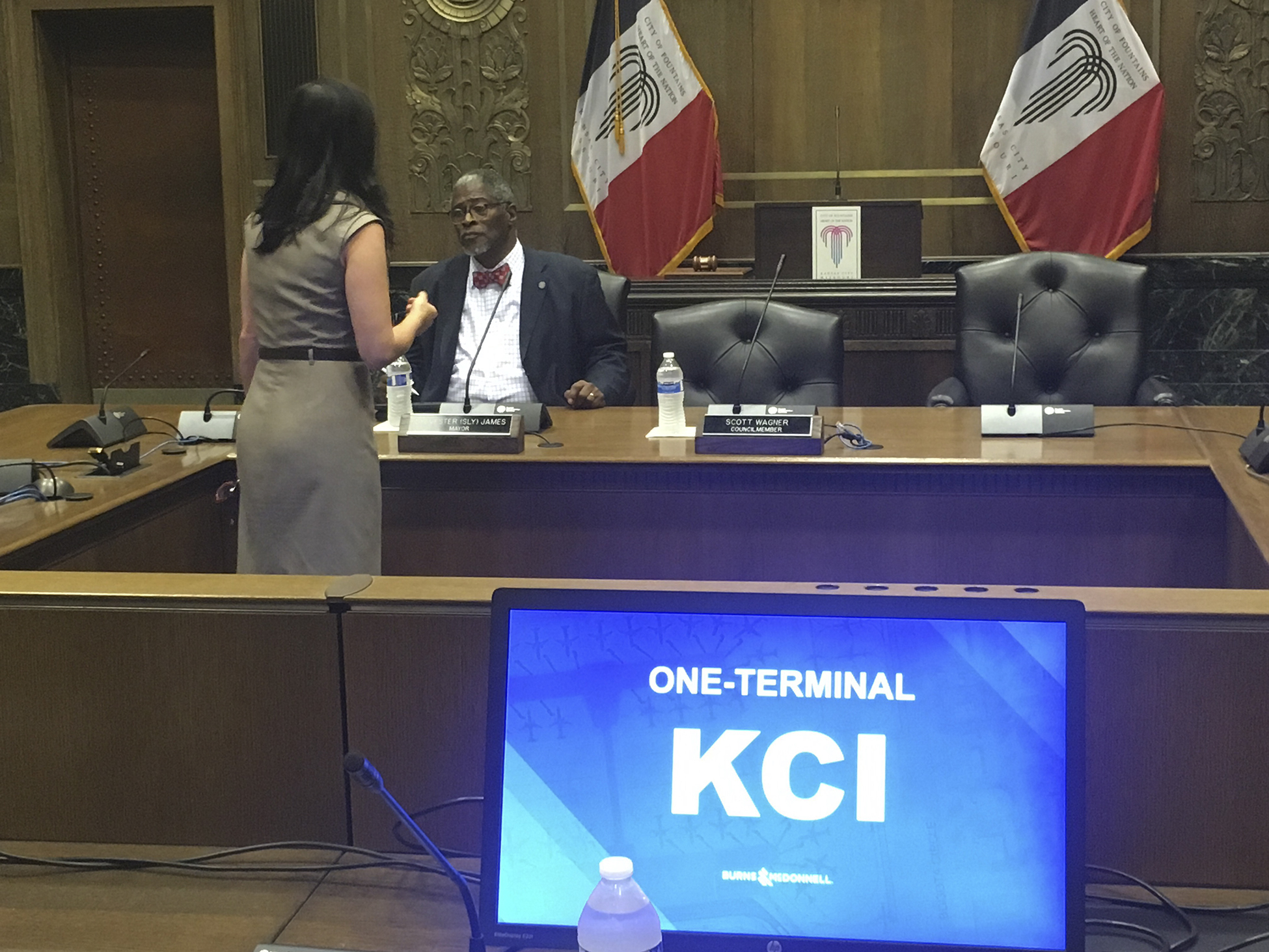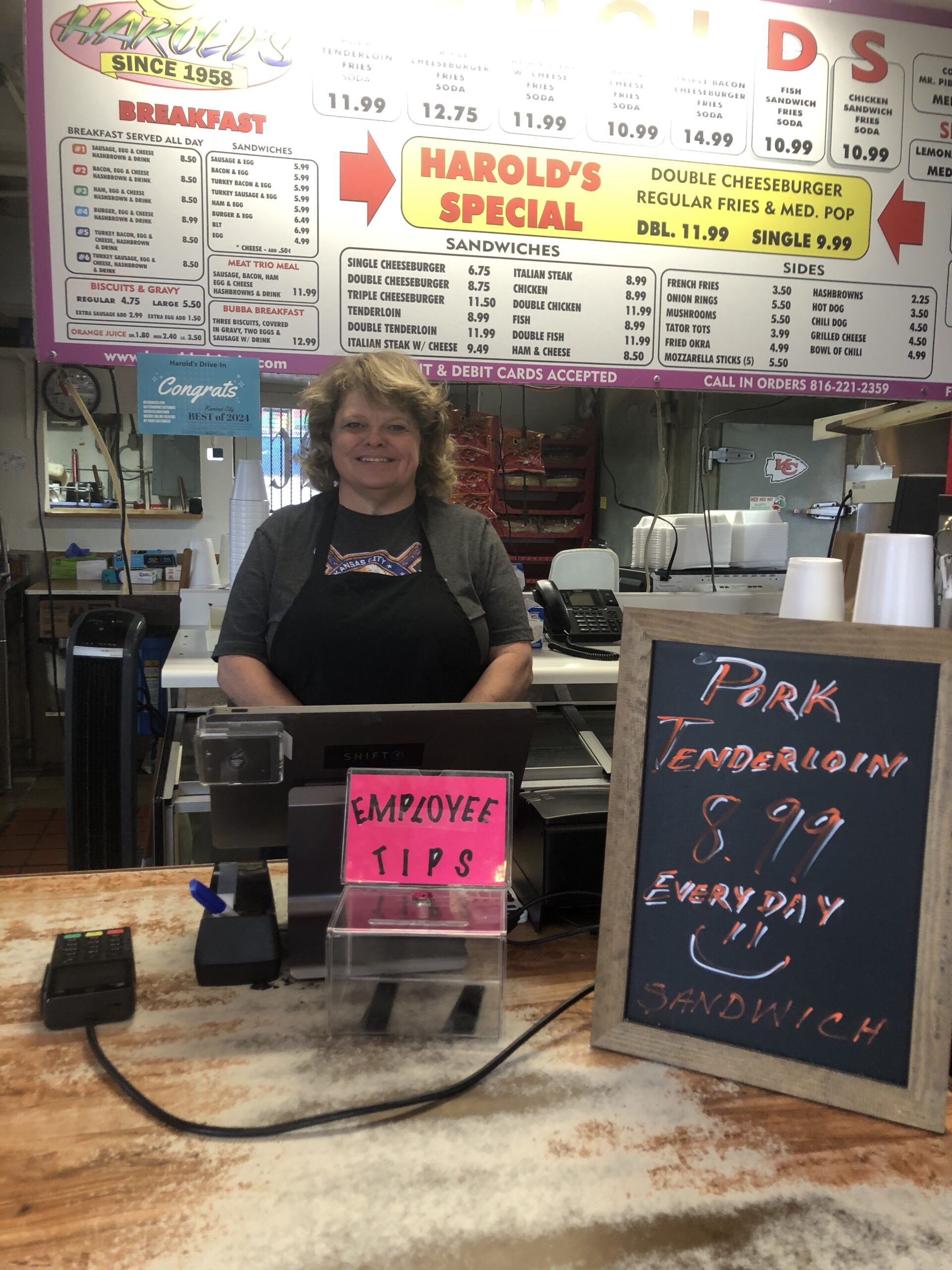
By Paul Thompson
Northeast News
May 24, 2017
KANSAS CITY, Missouri – A Burns & McDonnell proposal to privately finance the construction of a new single terminal at Kansas City International airport went under the microscope during the City Council’s Thursday, May 18 business session.
The meeting was moved from the 10th floor to the 26th floor Council Chambers to accommodate the large crowd gathered to hear from City leaders – and Burns & McDonnell CEO Ray Kowalik – about the proposed privately-financed plan to construct a new single terminal at KCI. By the time of the business session, the City Council had already been presented with a term sheet for a Memorandum of Understanding (MOU) with Burns & McDonnell on the financing plan. In the interest of due diligence, and facing discomfort regarding the notion of issuing a billion-dollar no-bid contract, the Council showed strong support during the business session in favor of hiring outside counsel to review the MOU before signing off on the proposal. During the Council’s legislative session later on May 18, the body voted 11-2 to spend $475,000 to retain that outside counsel to examine the merits of the deal.
Before that vote, however, the Council heard directly from Kowalik about what drove Burns & McDonnell to put together the financing plan for a single terminal airport.
“This is what we do. That is what our people do,” said Kowalik. “We are ranked No. 3 in airport design in this country, and have worked at 350 airports in this country. We’ve worked hard to build the trust of the Kansas City community.”
Kowalik described the single terminal as a win-win for area residents, leading to more direct flights out of Kansas City without relying on citizens to pass a tax increase or to back a bond issuance. Kowalik added that through the firm’s work at airports around the country, Burns & McDonnell has developed a close relationship with the airlines. The private investment used to finance construction is expected to be paid back primarily by the funds collected through the airport’s use agreement with the airlines, who have long backed a single terminal plan at KCI.
“Doing nothing at KCI is not an option,” said Kowalik. “What we do know is that the airlines don’t like the current KCI configuration.”
City Council members asked pointed questions during their face time with Kowalik and other Burns & McDonnell representatives. Councilman Jermaine Reed spoke first, describing the MOU as too vague while acknowledging that the current airport’s 1970s-era design is in need of reimagining.
“We in Kansas City are a world-class city,” said Reed. “A world-class city deserves a world-class airport.”
Kowalik spoke frankly about the frustration from the airlines regarding the long process Kansas City has taken on the path to a single terminal KCI. Ultimately he believes that the airlines will support the plan if taxpayers approve it in November, but he noted that they don’t want to lead the charge in front of City Council as they did during the previous push to update KCI. During the May 18 business session, Kowalik appeared comfortable carrying the torch for the proposal.
“It’s going to be a very convenient terminal,” he said. “I guarantee that with all my heart.”
Throughout the discussion, the City Council was clear in their assertion that the public would be getting the final word on the single terminal proposal. Burns & McDonnell described its intention to put together a plan that can be considered by the public ahead of a potential November 7, 2017 vote. The deadline to get the plan onto the November ballot is in late August.
Sixth District Councilman Kevin McManus thanked the firm for its commitment to following a robust process, and for giving Kansas City taxpayers the final say in the matter.
“It’s not without controversy, and it’s not without a kind of robust public dialogue,” McManus said. “I want to thank you all for remaining committed to the election process with this proposal.”
In terms of the single terminal’s design, Burns & McDonnell has proposed piggy-backing on the $964 million proposal that was originally put forth by the airlines in 2015. David Frantze, Burns & McDonnell’s counsel, estimated that the average increase in ticket price as a result of single terminal construction would fall somewhere between $4 and $5 per ticket. Additional funds could be collected through parking, as well as a potential 1% sales tax on goods purchased at the airport if a Community Improvement District (CID) is eventually established, as is being considered.
First District Councilman Scott Wagner pointed out that Kansas City residents typically don’t want their airport to be like those in big cities like Chicago, Los Angeles, or Atlanta. So what, he asked Kowalik, is the model for Kansas City’s single terminal design?
“The answer is it’s none,” said Kowalik, adding that Kansas City International has a unique advantage because it has an unused terminal where construction can begin unimpeded by typical airline activity.
If there are any issues completing the construction, Kowalik maintained, Burns & McDonnell would stand to lose more than anybody. Any failure on their end to complete the project as promised would keep them from collecting the millions of dollars in annual revenue needed to pay itself back for expenses incurred during construction.
Councilwoman Alissia Canady of the 5th District asked difficult questions during the business session, stating her hope that aggressive goals will be set for the participation of women-owned and minority-owned businesses in what is likely to be the largest single contract in the history of the city.
“The language provided in this MOU says good-faith efforts,” said Canady about the firm’s participation goals. “We’ve seen recently in local news that good-faith efforts are murky, because they are subjective.”
Canady relayed further concerns about the MOU, noting the fact that no specific language currently exists that outlines the expected return on investment for those pledging private funds towards construction of a new single terminal.
“I don’t know what kind of return that this investment group is anticipating,” said Canady.
In a follow-up discussion the day after the meeting, 1st District Councilman Wagner said that it was his impression that the investment group would be expecting a less-than-standard return on investment for the airport project.
“What we heard yesterday is that they would essentially be taking a below-market return,” said Wagner. “There’s obviously going to be a return expected for going through this and essentially being the middle man so that there is no City debt, and there is no City guarantee.”
“The margin for them is very minimal, which means that they have to be very sure of the cost controls,” he added.
Wagner also discussed why he voted against the $475,000 proposal to have outside counsel examine the Memorandum of Understanding with Burns & McDonnell.
“I voted no on that ordinance because I did not feel like having Council people go find a firm was the proper way to find the right firm,” said Wagner. “Especially when you know that the MOU eventually leads to a development agreement. I would rather have the extra eyes looking at that.”
While the investment group grapples with the financial side, Kansas City voters will have to consider the issue of convenience. Though many residents have expressed their satisfaction with the present convenience of the airport, Wagner described how the new proposal could make traveling even more painless for Kansas Citians.
“This is a math problem,” Wagner said. “Would you trade in an extra few minutes in an airport at home to avoid going and spending an hour or two somewhere else that is not your destination? Because that’s what we have right now.”
The public had their first opportunity to provide feedback on the single terminal proposal on Tuesday evening at the airport Marriott. The next opportunity to provide public input will occur on Thursday, May 25 at 9:15 a.m. at City Hall.

















